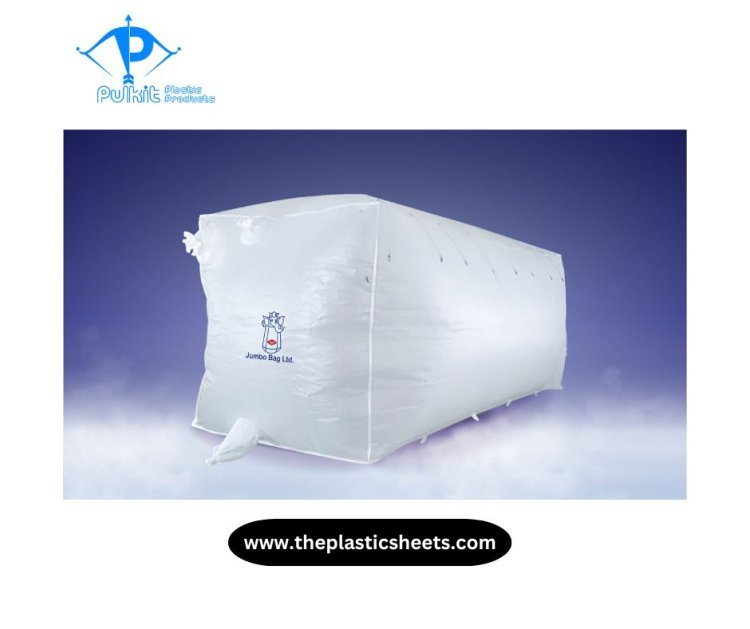Durable Container Liners for Bulk Material Transportation
Bulk container liners have become an integral part of modern logistics, offering a versatile and cost-effective solution for transporting bulk materials across industries.

Efficient and secure transportation of bulk materials is a cornerstone of global trade and industrial operations. The advent of container liners has revolutionized the way bulk goods are stored and transported, providing a reliable and cost-effective solution. These liners, also referred to as Bulk container liners, have become indispensable for industries handling powders, granules, chemicals, and agricultural products.
This article explores the benefits, applications, and features of container liners, delving into how container liners suppliers contribute to the supply chain. We will also address frequently asked questions about these products to provide comprehensive insights into their utility.
What Are Container Liners?
Container liners are flexible, durable liners placed inside standard shipping containers to facilitate the transportation of bulk materials. They act as protective barriers, ensuring the cargo remains uncontaminated and preventing spillage during transit. Commonly made from polyethylene or polypropylene, container liners are lightweight yet robust, offering excellent resistance to tears and punctures.
A Liner bag container is a specialized variant of container liners designed to fit snugly within a container's dimensions, enabling efficient loading and unloading processes while maintaining the integrity of the goods.
Key Features of Bulk Container Liners
- Durability: Constructed from high-strength materials, bulk container liners can withstand heavy loads and rough handling, ensuring long-lasting performance.
- Customizability: Container liners are available in various sizes and designs, catering to the specific requirements of different industries.
- Moisture and UV Resistance: Many liners are designed to resist moisture and UV radiation, protecting sensitive materials during transportation.
- Ease of Installation: Modern container liners are easy to install, reducing labor and time requirements.
- Eco-Friendly Options: Many Container liners suppliers now offer recyclable or biodegradable liners, aligning with sustainability goals.
Applications of Container Liners
Container liners are widely used across various industries due to their versatility and practicality. Some notable applications include:
- Agriculture: Farmers and agribusinesses use bulk container liners to transport grains, seeds, fertilizers, and other agricultural products. These liners help maintain product quality by preventing contamination and moisture ingress.
- Chemicals: The chemical industry relies on container liners to transport powders, resins, and other chemical substances. These liners ensure safety by containing potentially hazardous materials securely.
- Food Industry: Container liners are employed to transport bulk food products like sugar, flour, and coffee beans. Food-grade liners meet stringent hygiene standards to prevent contamination.
- Mining: Mining companies use liner bag containers to ship ores, minerals, and other raw materials. The liners protect the cargo and the container from abrasive materials.
- Pharmaceuticals: The pharmaceutical industry utilizes container liners to transport bulk raw materials, ensuring they remain uncontaminated and protected from environmental factors.
Benefits of Using Container Liners
- Cost-Effective: Container liners reduce the need for additional packaging materials, minimizing costs associated with bulk material transportation.
- Enhanced Cargo Protection: These liners prevent contamination, spillage, and exposure to external elements, ensuring the integrity of the cargo.
- Improved Efficiency: The use of container liners simplifies loading and unloading processes, saving time and labor costs.
- Environmental Sustainability: Recyclable and reusable options contribute to reducing waste and environmental impact.
- Space Optimization: Liner bag containers maximize the use of container space, allowing for efficient transportation of bulk goods.
Choosing the Right Container Liners
Selecting the right container liner for your needs involves considering several factors:
- Material Compatibility: Ensure the liner material is suitable for the cargo being transported. For example, food-grade liners are essential for edible products.
- Liner Design: Choose a liner design that complements your loading and unloading processes, such as spout-top or open-top liners.
- Size and Dimensions: Ensure the liner fits the container dimensions perfectly to avoid issues during installation and transit.
- Supplier Reputation: Partner with reliable container liners suppliers who offer quality products and excellent customer support.
- Environmental Considerations: Opt for eco-friendly liners to align with sustainability goals.
Conclusion
Bulk container liners have become an integral part of modern logistics, offering a versatile and cost-effective solution for transporting bulk materials across industries. From agricultural products to chemicals and food items, these liners ensure the safe and efficient movement of goods. By partnering with trusted container liners suppliers and selecting the right liner bag container, businesses can optimize their supply chains, reduce costs, and contribute to a more sustainable future.
Container liners represent more than just a packaging solution—they embody a commitment to innovation, efficiency, and environmental responsibility. As industries continue to evolve, the role of container liners in facilitating bulk material transportation will only grow, underscoring their importance in the global economy.
Frequently Asked Questions (FAQs)
What materials are container liners made of?
Container liners are typically made from high-density polyethylene (HDPE) or woven polypropylene. These materials provide flexibility, durability, and resistance to environmental elements including UV rays and moisture.
Can container liners be reused?
Yes, many container liners can be reused, depending on their design and the type of cargo transported. Reusable liners must be thoroughly cleaned and inspected before reuse to ensure they remain fit for purpose.
How do container liners improve bulk material transportation?
Container liners enhance bulk material transportation by preventing contamination, reducing spillage, and protecting cargo from moisture and other environmental factors. They also streamline loading and unloading processes, making transportation more efficient.
What's Your Reaction?















